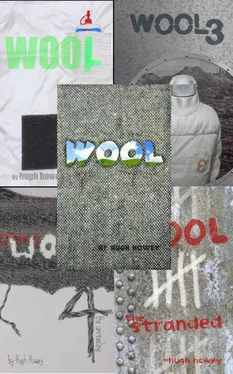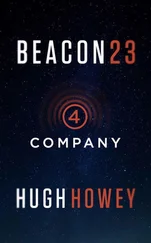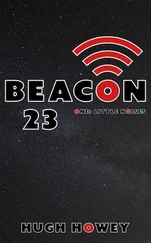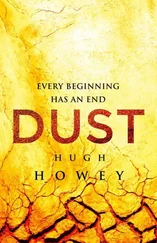Juliette heard herself wheezing for air and knew her time had run out. She imagined the poison all over her like grease. The toxic air that she’d let in was a cloud of vermin just waiting for her to crawl out of her shell so they could eat away at her.
She considered lying down and letting her air supply run out instead. She would be preserved in this chrysalis of a suit, a well-built suit, a gift from Walker and the people of Supply. Her body would lie forever in this dim silo that shouldn’t exist—but so much better than to rot on a lifeless hill and fly away, piece by piece, on a fickle breeze. It would be a good death. She panted, proud of herself for making it somewhere of her own choosing, for conquering these last few obstacles. Slumping against the door, she very nearly laid down and closed her eyes—but for the nagging of her curiosity.
Juliette held up her hands and studied them in the dim glow from the stairwell. The shiny gloves—wrapped in heat tape and melted to form a bright skin—made her look like a machine of sorts. She ran her hands over the dome of her helmet, realizing she was like a walking toaster. When she had been a mere shadow in Mechanical, she’d had a bad habit of taking things apart, even those that already worked. What had Walker said of her? That she liked nothing more than peering inside of toasters.
Juliette sat up and tried to focus. She was losing sensation, and with it the will to live. She shook her head and pulled herself to her feet, sent a pile of chairs crashing to the floor. She was the toaster, she realized. Her curiosity wanted it open. This time, to see what was outside . To take one breath and know.
She swam through the tables and chairs, wanting more and more distance between herself and any bad air she had let in. The bodies she had crawled over in the sheriff’s office had felt whole. Naturally dead. Trapped inside and starved or asphyxiated, perhaps. But not rotten. Still, and despite her lightheadedness and need to breathe, she wanted to somehow douse herself before cracking the helmet.
She escaped the barrier of tables and chairs and made her way across the open cafeteria floor. The emergency lights in the stairwell leaked a green glow to dimly show the way. She passed through the serving door and into the kitchen, and tried the taps on the large sink. The handles turned, but the spout didn’t leak a drop, didn’t knock with even a futile try from distant pumps. She went to the dangling hose over the dish station and pulled that lever—and was similarly rewarded. There was no water.
Her next thought was the walkins, to maybe freeze the nastiness she could feel crawling all over her suit. She staggered around the cooking stations and pulled the large silver handle on the door, her breath wheezy in her helmet. The light in the back reaches of the kitchen was already so dim she could barely see. She couldn’t feel any cold through her suit, but wasn’t sure if she’d be able to. It was built to shield her and built well. The overhead light didn’t come on, so she assumed the freezer was dead. With the door open, she peered inside, looking for anything fluid, and saw what looked like vats of soup.
She was desperate enough to try anything. Juliette moved inside the walk-in, letting the door swing slowly shut behind her. She seized one of the large plastic containers, a bucket the size of the largest cooking pots, and tore the top off. The door clicked shut, returning her to solid darkness. Juliette knelt beneath the shelf and tipped the massive bucket over. She could feel the liquid soup splatter over her suit, crinkling it and splashing to the floor. Her knees slipped in the stuff. She felt for the next one and did the same, ran her fingers into the puddles and coated herself in it. There was no way of knowing if she was being crazy, if she was making things worse, or if any of it mattered. Her boot slipped, sending her flat onto her back, her helmet cracking against the floor.
Juliette lay there in a puddle of tepid soup, unable to see, her breath raspy and stale. Her time had run out. She was dizzy and could think of nothing else to try, didn’t have the breath or energy, anyway. The helmet had to come off.
She fumbled for the latches, could barely feel them through her gloves. Her gloves were too thick. They were going to kill her.
She rolled to her belly and crawled through the soup, her hands and knees slipping. She reached the door, gasping, and fumbled for the handle, found it, threw the door open. There was a rack of knives gleaming behind the counter. She lurched to her feet and grabbed one, held the blade in her thick mitts, and slumped to the floor, exhausted and dizzy.
Turning the blade toward her own neck, Juliette groped for the latch. She slid the point along her collar until it caught in the crack of the button. Steadying herself, her arm shaking, she moved the knife and pressed in, shoving it toward her body against all physical revulsion at the act.
There was a faint click. Juliette gasped and groped along the rim with the blade for the other button until she found it. She repeated the maneuver.
Another click, and her helmet popped off.
Juliette’s body took over for her, urging deep gulps of foul air. The stench was unbearable, but she couldn’t stop gasping for more. Rotted food, biological decay, a tepid filth of stenches invaded her mouth, tongue, nose.
She turned to the side and wretched, but nothing came out. Her hands were still slippery with soup. Breathing was painful; she imagined a burning sensation on her skin, but it could’ve been her fevered state. She crawled away from the walk-in, toward the cafeteria, out of the fog of rotting soup before she managed a gulp of air.
Air .
She took another lungful, the odor still overpowering, the soup coating her. But beyond the stench, something else was there. Something faint. Something breathable that began to force away the dizziness and the panic. It was oxygen . Life.
Juliette was still alive.
She laughed a mad laugh and stumbled toward the stairwell, drawn to the green glow of light, breathing deeply and too exhausted to appreciate this, the impossible life still in her.
“For you and I are past our dancing days.”
Knox saw the uproar in Mechanical as just another emergency to overcome. Like the time the basement subwall sprung a leak, or when the oil rig hit that pocket of methane and they had to evacuate eight levels until the air handlers made it safe to return. Against the inevitable flow of commotion, what he needed to do was push for order. To assign tasks. He had to break a huge undertaking down to discrete bits and make sure they fell to the right hands. Only this time, he and his people wouldn’t be setting out to repair something. There were things the good people of Mechanical meant to break .
“Supply is the key,” he told his foremen, pointing to the large scale blueprint hanging on the wall. He traced the stairwell up the thirty flights to Supply’s main manufacturing floor. “Our greatest advantage is that IT doesn’t know we’re coming.” He turned to his shift leaders. “Shirly, Marck, and Courtnee, you’ll come with me. We’ll load up with supplies and take your shadows with us. Walker, you can wire ahead to let ‘em know we’re coming. Be discrete, though. Assume IT has ears. Say we have a load of your repairs to deliver.”
He turned to Jenkins, who had shadowed under Knox for six years before he grew his own beard and moved to third shift. The assumption everywhere was that Knox’s job was his in waiting. “Jinks, I want you to take over down here. There are no days off for a while. Keep the place running, but get ready for the worst. I want as much food stockpiled as possible. And water. Make sure the cistern is topped up. Divert from the hydroponics feed if you have to, but be discrete. Think of an excuse, like a leak or something, in case they notice. Meanwhile, have someone make the rounds and check every lock and hinge, just in case the fighting comes to us. And stockpile whatever weapons you can make up. Pipes, hammers, whatever.”
Читать дальше












